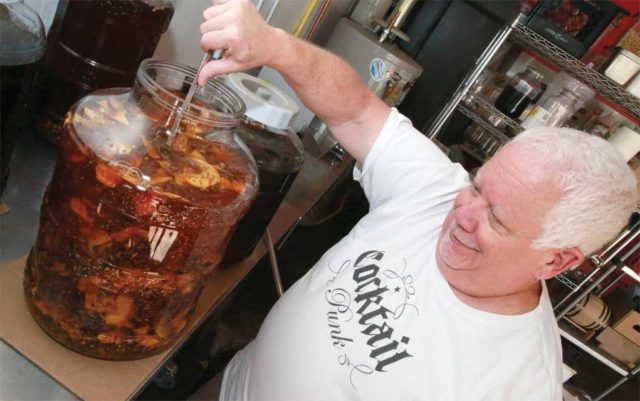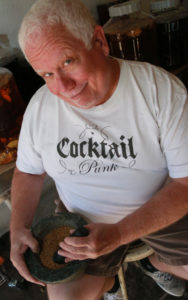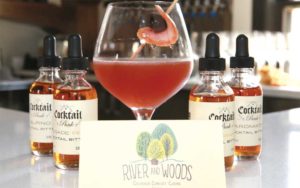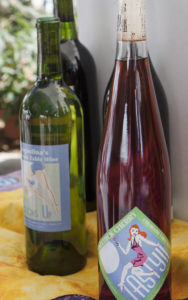
Raymond Snead says it’s all about maceration. When you do it right — that is, soaking fruit and spices in alcohol and extracting the essence — it can rock your flavor world.
In his Boulder facility, Snead puts the pure, carefully filtered results in dropper bottles and sells them under the Cocktail Punk bitters label. Bitters are the wow factor in a cocktail that you don’t miss until it’s not there. Bitter beverages include tonic water, “shrubs” or drinking vinegars, aperitifs, stomach-settling digestifs and spirits like gin, which is infused with juniper berry and botanicals. The big bitters makers are Angostura and Peychaud’s, but now there is an American artisan bitters boom including Colorado’s other craft bitters bottler, Silver Plume-based Dram Apothecary.
Essentially, Snead is Cocktail Punk, but he has several part-time employees who help with bottling, labeling and shipping internet orders. Snead shares his Boulder location with Bougie Syrups, a startup making flavored bartenders’ syrups including lime and ginger lightly sweetened with Colorado honey.
Raised on ethnic food and punk rock in the Washington, D.C. suburbs, Snead had no inkling he would end up crafting artisan bitters. We met to talk about his bitters path over Ozo coffee at the Walnut Café.

Q: How did you develop your sense of taste?
A: I had a strong bond with my mother over cooking as a very young child. She gave me the set of Time-Life Foods of the World cookbooks when I was 12 and we cooked our way through them, things like Peking duck. I’ve always paid close attention to how things taste.
Q: How did you end up in Boulder?
A: As a 16 year old I did get deeply into rock climbing. I moved to Boulder in 1976 to get a masters in computer science from CU. I started getting deeply into wine when I worked at the Boulder Wine Merchant. It takes time to learn and taste everything, to train your palate, so it was ideal. I worked at local tech companies while consulting on wine web sites.
Q: What is the first cocktail you remember?
A: Like so many of us Baby Boomers, I rebelled against cocktails because my parents drank them. My parents liked the classic afternoon gin and tonic. I started with wine. Somewhere along the line I started getting into cocktails. I liked the complexity of mixed drinks and took it seriously.
Q: How did you end up making bitters at home?
A: There’s an old bartender’s trick of adding a little juice from dark cherries along with the bitters to make a Manhattan. I thought: Why not just make cherry bitters? So I started making them for myself. Then my friends asked for a few bottles to give as gifts. I took it to Bryan Dayton at OAK [at fourteenth], Allison Anderson at Frasca and other bartender friends and they loved it. With their encouragement, Cocktail Punk was born.
Q: What’s with the company name?
A: Cocktail Punk is the confluence of high and low culture. I was really into the late ’70s punk scene around Washington, D.C. My favorite album was 13 Songs by Fugazi.
Q: Why are bitters important?
A: The food analogy is salt. You don’t want a tablespoon of salt in your mouth but you need a little bit. Salt does great things for food flavor. Bitters do the same thing for cocktails. You just use a drop or two at a time.
Q: How do you use bitters besides drinks?
A: I like to drink sparkling water with a drop of bitters. Some bakers add smoked orange bitters to frosting. The bitter element and the use of spices go well in things like spice cake and with dark chocolate. It’s like adding vanilla extract.
Q: How do you make bitters?

A: To make the orange flavor I start with organic navel oranges. We just use the zest, the orange part, so we zest them by hand if necessary. For others it is dried cherries or peaches. The fruit goes in a homebrewing glass carboy with only grain neutral spirits — no water. You add bitter roots like gentian, barks and spices like cinnamon or mace. It takes 10 to 15 days then it’s filtered and bottled. The hard part is to make bitters that taste the same every time using natural ingredients.
Q: Your bitters had to be declared ‘unfit for beverage purposes?’
A: Because Cocktail Punk bitters are pure alcohol I had to submit the formulas to a Flavor Unfitness Panel for tasting. Basically, it has to taste so bitter that nobody would just drink it. Like vanilla extract.
Q: What flavors are coming next?
A: We are making Colorado lavender bitters, which are used in a lot of gin drinks. I’m working on barrel-aged bitters using bourbon and other barrels. The wood does the same thing it does to spirits and wine, it softens and rounds out the flavor and gives it a woody quality.
Local Food News
Fort-Collins-based William Oliver’s Publick House, a whiskey and bacon bar which does not allow tipping servers, will open a second location at 201 N. Public Road in Lafayette later this year. … Boulder is getting another brewery, Gunbarrel Brewing. The location will be announced soon. . … The 25th Colorado Mountain Winefest this weekend in Palisade features dozens of wineries, cideries and meaderies. coloradowinefest.com … The world’s longest bratwurst is featured Sept. 23-24 at Longmont’s Oktoberfest, plus suds from 10 breweries and food from Georgia Boys BBQ. lefthandbrewing.com
Taste of the Week

You may ask yourself: What’s the best wine to go with cherry pie or roast pork loin or pignoli cookies? The answer is WineChick Cherry made from organic Montmorency cherries, the variety that make the very best cherry pies. This is not a wine to ponder, just a light rose-colored wine with an easy-sipping, sweet-tart flavor. WineChick Cherry is available at Nederland’s only winery, Augustina’s, and at the winery’s booth at the Boulder County Farmers’ Market in Boulder.
Words to Chew On
“Water is needed to live, but wine expresses the abundance of the banquet and joy of the celebration … Wine is necessary for the celebration.” — Pope Francis
John Lehndorff formerly wrote about food for Tank Works Weekly, Rocky Mountain Magazine, Audience Magazine, Front Range Magazine, the Rocky Mountain News and other Colorado publications. He hosts Radio Nibbles at 8:25 a.m. Thursdays on KGNU. Comments to: [email protected].














